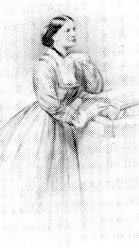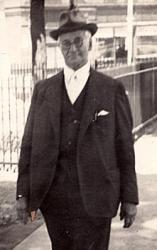Planning worship?
Check out our sister site, ZeteoSearch.org,
for 20+ additional resources related to your search.
- |
User Links
Person Results
‹ Return to hymnal




Export as CSV
Charlotte Alington Barnard

1830 - 1869 Person Name: Mrs. Charles Barnard Hymnal Number: 187 Composer of "[Give of your best to the Master]" in The Cokesbury Worship Hymnal Mrs. Charles Barnard, usage: Claribel. See also Claribel, 1830-1869
Charlotte Alington Barnard
W. S. Marshall
Hymnal Number: 36 Composer of "[Joys are flowing like a river]" in The Cokesbury Worship Hymnal He composed tunes for gospel lyric writers.
John Perry
W. S. Marshall
Carrie E. Rounsefell
1861 - 1930 Hymnal Number: 142 Composer of "[It may not be on the mountain's height]" in The Cokesbury Worship Hymnal Carrie Esther Parker Rounsefell USA 1862-1930. Born at Merrimack, NH, she grew up in Manchester, NH. She married William Rounsefell, a bookkeeper. She was known as a singing evangelist throughout New England and New York, where she toured with a small autoharp (zither). She died at Durham, ME.
John Perry
Carrie E. Rounsefell
George Orlia Webster

1866 - 1942 Person Name: George O. Webster Hymnal Number: 125 Author of "I Need Jesus" in The Cokesbury Worship Hymnal
George Orlia Webster
William Vincent Wallace
1812 - 1865 Person Name: William V. Wallace Hymnal Number: 70 Composer of "SERENITY" in The Cokesbury Worship Hymnal
William Vincent Wallace
Alexander Pope

1688 - 1744 Person Name: Alexander Pope, 1688-1744 Hymnal Number: 154 Author of "Rise, Crowned with Light" in The Cokesbury Worship Hymnal Alexander Pope was born in London, in 1688. His parents were Roman Catholics. He had a feeble constitution, was deformed in person, and attained the age of only fifty-six. He early acquired the means of independence by his literary gifts, and purchased his celebrated villa at Twickenham, whither he went to reside at the age of thirty. Of his many published works, his translation of the "Iliad" and "Odyssey" of Homer has given him the greatest reputation. As an English satirist, also, he stands very high. Nearly all his works, however, are imitations. He died at Tickenham, in 1744.
--Annotations of the Hymnal, Charles Hutchins, M.A., 1872
========
Pope, Alexander, the poet, son of a wholesale linen merchant in Lombard Street, London, was born in Plough Court, Lombard Street, May 21, 1688. His father being a Roman Catholic, he was first placed under the charge of Father Taverner, who taught him the rudiments of Greek and Latin. Later he attended a school at Winchester, and then at Hyde Park Corner. When about twelve he retired with his parents to Binfield, in Windsor Forest, and from thenceforth his education was mainly in his own hands. His subsequent success as a writer and poet is a matter of history, and has been dealt with in detail by Dr. Johnson in his Lives of the Poets, and by others. He died May 30, 1744, and was buried in a vault in Twickenham Church. For distinct public use, so far as we are aware, Pope wrote no hymns. His "Messiah"; his "Universal Prayer"; and his "Vital Spark" (q.v.), have been made use of for congregational purposes, but as a Roman Catholic he had no object in writing a hymn in a language which, at that time, his Church would refuse to use. In modern hymn-books his name is identified with the following pieces:--
1. Father of all, in every age. Universal Prayer. The Lord's Prayer. This Prayer was published in 1738, as a conclusion to his Essay on Man, in 13 st. of 4 1. Warburton in his Advertisement of the 1748 ed. of the Essay, says:—
"Concerning the Universal Prayer which concludes the Essay, it may be proper to observe that some pas¬sages in the Essay having been unjustly suspected of a tendency towards Fate and Naturalism, the author composed that Prayer as the sum of all, to show that hi a system was founded in Freewill, and terminated in Piety: that the First Cause was as well the Lord and Governor as the Creator of the Universe; and that by submission to His will (the great principle enforced throughout the Essay) was not meant the suffering ourselves to be carried along with a blind determination; but a religious acquiescence, and confidence full of hope and immortality. To give all this the greater weight and reality, the Poet chose for his model The Lord's Prayer, which of all others best deserves the title prefixed to his Paraphrase."
The title here referred to is "The Universal Prayer, Deo Opt. Max." The hymn is found in common use in the following forms:—
(1.) Father of all in every age. This is an abbreviated form, and has been in use, especially in Unitarian hymnbooks, from an early date.
(2.) Father of all, [and] Thou God of love. This cento was given in 6 st. of 4 1. in the 1815 edition of Cotterill's Selections, No. 2; again in the 1819 ed., 141; in Stowell's Psalms & Hymns, 1831, No. 179; and again in later collections.
(3.) Not to this earth's contracted span. In Collyer's Collection 1812, No. 629, in 4 st. of 4 1., and others.
(4.) Teach me to feel another's woe. Also in Collyer's Collection, 1812, No. 630, in 4 st. of 4 1., and others.
(5.) Thou Great First Cause, least understood. Also in Collyer's Collection, 1812, No. 628, in 4 st. of 4 1., and later hymnals.
(6.) When I am right Thy grace impart. Given in Kennedy, 1863, No. 1166.
2. Ye nymphs of Solyma! begin the song. The Messiah. In No. 378 of the Spectator for Wednesday, May 14, 1712, Addison gave this poem with the introduction :—
"I will make no apology for entertaining the reader with the following poem, which is written by a great genius, a friend of mine, in the country, who is not ashamed to employ his wit in the praise of his Maker."
Then follows the poem with the heading, “Messiah. A Sacred Eclogue, composed of several passages of Isaiah the Prophet. Written in imitation of Virgil's Pollio." It consists of 107 lines. When republished by Pope this heading was expanded into a paragraph as an "Advertisement." As a poem it is unknown to the hymn-book; but from it the following centos have passed into common use:--
(1.) As the Good Shepherd tends his fleecy care. This was given in Collyer's Collection, 1812, No. 626, in 6 st. of 4 1., and has been repeated in later hymnals, but usually in an abridged form.
(2.) From Jesse's root, behold a branch arise No. 624 in Collyer's Collection, 1812, in 5 st. of 4 1.; and again in later hymnals.
(3.) Hark! a glad voice the lonely desert cheers. No. 625 in Collyer's Collection, 1812, in 4 st. of 4 1.; in Bishop Heber's posthumous Hymns, &c, 1827, p. 106; and again in later collections.
(4.) Rise crowned with light, imperial Salem rise. In the Leeds Hymn Book, 1853, No. 687, in 3 st. of 8 1., and several later collections.
(5.) The Saviour comes! by ancient seers foretold. In Mercer's Church Psalm & Hymn Book, 1864, and others.
It may be noted that 1. 46 of The Messiah reads in the original "He wipes the tears for ever from our eyes." This was altered by Pope at the suggestion of Steele, made to Pope in a letter dated June 1, 1712, to "From every face He wipes off every tear." This latter is the poet's authorized reading, is given in his Works, and is found also in the book form reprints of the Spectator.
-- John Julian, Dictionary of Hymnology (1907)
Alexander Pope
Ozora Stearns Davis

1866 - 1931 Person Name: Ozora S. Davis, 1866-1931 Hymnal Number: 156 Author of "At Length There Dawns the Glorious Day" in The Cokesbury Worship Hymnal Born: July 30, 1866, Wheelock, Vermont.
Died: March 15, 1931, Chicago, Illinois.
Davis grew up in White River Junction, Vermont, and by age 15 was an expert telegraph operator. He attended St. Johnsbury Academy and graduated from Dartmouth College, Hanover, New Hampshire, in 1889. With the aid of a fellowship from Hartford Theological Seminary, he earned a PhD in Leipzig, Germany. He pastored in Springfield, Vermont; Newtonville, Massachusetts, and New Britain, Connecticut. From 1909-29, he was president of Chicago Theological Seminary. In 1927 he became Moderator of the National Council of Congregational Churches. His works include:
John Robinson–The Pilgrim Pastor, 1903
Elihu Burritt (New Britain: 1907)
The Pilgrim Faith, 1913
Using the Bible in Public Address, 1916
Meeting the Master, 1917
International Aspects of Christianity, 1919
Comrades in the Great Cause
The Gospel in the Light of the Great War, 1919
Evangelistic Preaching, 1921
Preaching and the Social Gospel, 1922
Davis died near Kansas City, Missouri, while traveling with Grace, his wife, from Los Angeles to Chicago.
--www.hymntime.com/tch/b
Ozora Stearns Davis
Colin Sterne
Hymnal Number: 158 Author of "We've a Story to Tell" in The Cokesbury Worship Hymnal Pseudonym, See also Nichol, H. Ernest, 1862-1928
Colin Sterne
George Whelpton
1847 - 1930 Person Name: George Whelpton, 1847- Hymnal Number: 267 Composer of "[Hear our prayer, O Lord]" in The Cokesbury Worship Hymnal
George Whelpton
C. Meineke
1782 - 1850 Person Name: Charles Meineke Hymnal Number: 1 Composer of "[Glory be to the Father, and to the Son, and to the Holy Ghost]" in The Cokesbury Worship Hymnal Meineke (1782-1850) is referred to by several given names including C., Charles, Christopher, Christoph, and Karl. Meineke apparently left Germany in 1810 and, after spending some time in England, moved to the United States, settling in Baltimore, Maryland, by 1822. He was organist at St. Paul’s Episcopal Church in Baltimore in 1836, likely serving in this position for some eight years.
Meineke published several works including "Music for the Church: Containing Sixty-two Psalm and Hymn Tunes in Four Parts: Together with Chants, Doxologies and Responses for Morning and Evening Prayer, and Holy Communion: Composed for the Use of the Choir of St. Paul's Church, Baltimore" (Baltimore, 1844). He composed the music for Glory Be to the Father and to the Son (MEINEKE).
Source: Danny R. Jones, "Christoph Meineke," Worship Matrix, http://www.worshipmatrix.com/Composerr.php?code=335
C. Meineke


 My Starred Hymns
My Starred Hymns


